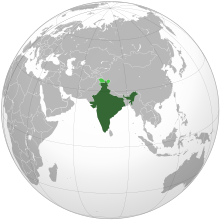Intersex rights in India
|
Intersex rights in India |
|
|---|---|

Area controlled by India shown in dark green;
claimed but uncontrolled regions shown in light green. |
|
| Protection of physical integrity and bodily autonomy | No |
| Reparations | No |
| Protection from discrimination | No |
| Rights by country | |
Intersex people in India face human rights violations including infanticide and neglect, with significant gaps in protection from mutilation and non-consensual cosmetic medical interventions and protection from discrimination.
Intersex issues in India may often be perceived as third sex issues. The most well-known third-gender group in India is perhaps the hijra of northern India. After interviewing and studying the hijra for many years, Serena Nanda writes in her book, Neither Man Nor Woman: The hijras of India, as follows: "There is a widespread belief in India that hijras are born hermaphrodites [intersex] and are taken away by the hijra community at birth or in childhood, but I found no evidence to support this belief among the hijras I met, all of whom joined the community voluntarily, often in their teens."
Sangam literature uses the word pedi to refer to people born with an intersex condition; it also refers to antharlinga hijras and various other hijras, Intersex people are popularly known as Mabedi Usili in Hijra community but their identity always remained as an distinct identity from popular hijra community.
This belief has an impact when infants are born. Warne and Raza argue that an association between intersex and hijra people is mostly unfounded but provokes parental fear about the possible future life of their child.
Intersex persons are not protected from violations to physical integrity and bodily autonomy.
Cases of infanticide have been reported involving infants with obvious intersex conditions at birth, along with a failure to thrive by infants assigned female. Medical reports suggest that parents in India prefer to assign infants with intersex conditions as male, with surgical interventions taking place when parents can afford them.
In a reply to a letter from an intersex rights activist Gopi Shankar Madurai, the Ministry of Health and Family Welfare, India replied that “Any kind of invasive medical procedure including sex reassignment surgeries are done only after thorough assessment of the patient, obtaining justification for the procedure planned to be conducted with the help of appropriate diagnostic test and only after taking a written consent of the patient/guardian”.
...
Wikipedia
